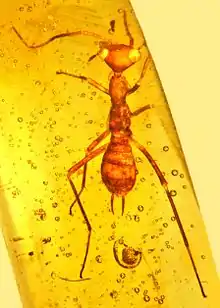Alienopteridae
Alienopteridae is an extinct family of dictyopterans, known from the Mid-Cretaceous to Eocene. It was originally assigned to its own order Alienoptera by Bai et al, 2016. It was reassigned to the dictyopteran superfamily Umenocoleoidea as sister family to Umenocoleidae by Vršanský et al. (2018),[1] and a more recent analysis similarly places Alienopteridae and Umenocoleidae as sister taxa within Dictyoptera, but placing both lineages outside of Blattodea.[2] The majority of the alienopterid genera are known from the Cenomanian aged Burmese amber found in Myanmar;[3][4][5][1][6][7] though an additional two genera (Apiblatta and Vcelesvab) are from the Albian Crato Formation (Brazil), and the two youngest genera (Chimaeroblattina and Grant) are from the middle Eocene Green River Formation (Colorado, United States). Some taxa have been suggested as mimics of various hymenopterans, including bees and ants.[1] However this was mostly rejected in another study.[8] Some taxa were probably predators adapted to moving through dense foliage.[8]
| Alienopteridae | |
|---|---|
 | |
| Aethiocarenus, a presumed alienopteran nymph | |
| Scientific classification | |
| Kingdom: | Animalia |
| Phylum: | Arthropoda |
| Class: | Insecta |
| Superfamily: | †Umenocoleoidea |
| Family: | †Alienopteridae Bai et al, 2016 |
| Type genus | |
| †Alienopterus Bai et al, 2016 | |
| Genera | |
| |
| Synonyms | |
| |
Genera
- Superfamily †Umenocoleoidea Chen & Tan, 1973
- Family †Alienopteridae Bai et al., 2016
- †Aethiocarenus Poinar & Brown, 2016
- †Alienopterella Kočárek, 2018
- †Alienopterix Mlynský et al.' 2018
- †Alienopterus Bai et al. 2016
- †Apiblatta Barna & Bigalk, 2018
- †Caputoraptor Bai et al., 2018
- †Chimaeroblattina Barna, 2018
- †Formicamendax Hinkelman, 2019
- †Grant Aristov, 2018
- †Meilia Vršanský & Wang, 2018
- †Teyia Vršanský et al., 2018
- †Vcelesvab Vršanský et al. 2018
- †Vzrkadlenie Sendi et al, 2020
- Family †Alienopteridae Bai et al., 2016
An undescribed species is also known from the Turonian aged Orapa kimberlite pipe sediments in Botswana.[1] The assignment of the genera Alienopterix and Vzrkadlenie to this group is disputed, as Luo, Xu & Jarzembowski (2020) transferred them to the family Cratovitismidae.[9]
References
- Peter Vršanský; Günter Bechly; Qingqing Zhang; Edmund A. Jarzembowski; Tomáš Mlynský; Lucia Šmídová; Peter Barna; Matúš Kúdela; Danil Aristov; Sonia Bigalk; Lars Krogmann; Liqin Li; Qi Zhang; Haichun Zhang; Sieghard Ellenberger; Patrick Müller; Carsten Gröhn; Fangyuan Xia; Kyoichiro Ueda; Peter Vďačný; Daniel Valaška; Lucia Vršanská; Bo Wang (2018). "Batesian insect-insect mimicry-related explosive radiation of ancient alienopterid cockroaches". Biologia. 73 (10): 987–1006. doi:10.2478/s11756-018-0117-3. S2CID 52270212.
- Liuo, C.-H.; Beutel, R. G.; Thomson, U. R; Zheng, D.-R.; Li, J.-H.; Zhao, X.-Y.; Zhang, H.-C.; Wang, B. (2021). "Beetle or roach: systematic position of the enigmatic Umenocoleidae based on new material from Zhonggou Formation in Jiuquan, Northwest China, and a morphocladistic analysis". Palaeoworld. in press. doi:10.1016/j.palwor.2021.01.003.
- Kočárek, Petr (2018). "Alienopterella stigmatica gen. et sp. nov.: the second known species and specimen of Alienoptera extends knowledge about this Cretaceous order (Insecta: Polyneoptera)". Journal of Systematic Palaeontology. 17 (6): 1–10. doi:10.1080/14772019.2018.1440440. ISSN 1477-2019. S2CID 90147082.
- Bai, Ming; Beutel, Rolf Georg; Klass, Klaus-Dieter; Zhang, Weiwei; Yang, Xingke; Wipfler, Benjamin (2016). "†Alienoptera — A new insect order in the roach–mantodean twilight zone". Gondwana Research. 39: 317–326. doi:10.1016/j.gr.2016.02.002.
- Ming Bai; Rolf Georg Beutel; Weiwei Zhang; Shuo Wang; Marie Hörnig; Carsten Gröhn; Evgeny Yan; Xingke Yang; Benjamin Wipfler (2018). "A new Cretaceous insect with a unique cephalo-thoracic scissor device". Current Biology. 28 (3): 438–443.e1. doi:10.1016/j.cub.2017.12.031. PMID 29395923.
- Jan Hinkelman (2019). "Earliest behavioral mimicry and possible food begging in a Mesozoic alienopterid pollinator". Biologia. 75: 83–92. doi:10.2478/s11756-019-00278-z. S2CID 189776766.
- Hemen Sendi; Jan Hinkelman; Lucia Vršanská; Tatiana Kúdelová; Matúš Kúdela; Marcus Zuber; Thomas van de Kamp; Peter Vršanský (2020). "Roach nectarivory, gymnosperm and earliest flower pollination evidence from Cretaceous ambers". Biologia. Online edition. doi:10.2478/s11756-019-00412-x. S2CID 210938183.
- Wipfler, Benjamin; Kočárek, Petr; Richter, Adrian; Boudinot, Brendon; Bai, Ming; Beutel, Rolf Georg (2019-10-31). "Structural features and life habits of †Alienoptera (Polyneoptera, Dictyoptera, Insecta)". Palaeoentomology. 2 (5): 465–473. doi:10.11646/palaeoentomology.2.5.10. ISSN 2624-2834.
- Cihang Luo; Chunpeng Xu; Edmund A. Jarzembowski (2020). "Enervipraeala nigra gen. et sp. nov., a umenocoleid dictyopteran (Insecta) from mid-Cretaceous Kachin amber". Cretaceous Research. 119: Article 104702. doi:10.1016/j.cretres.2020.104702.